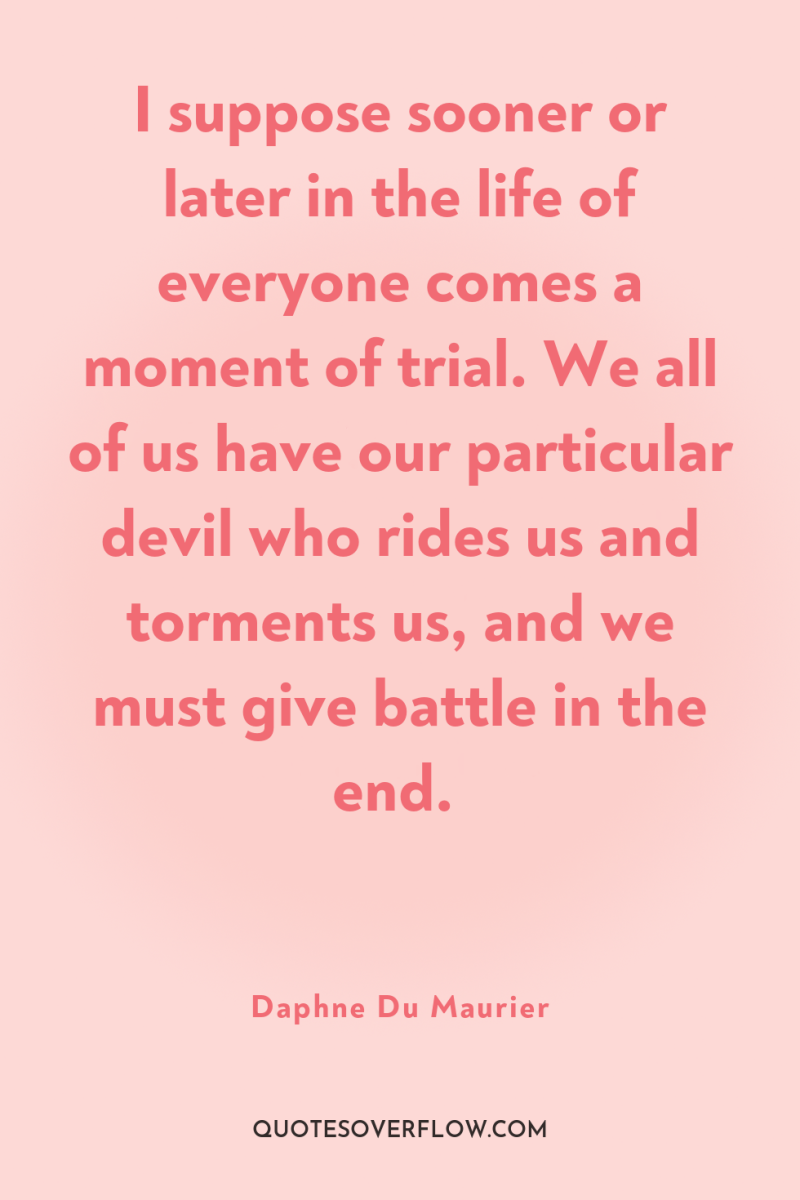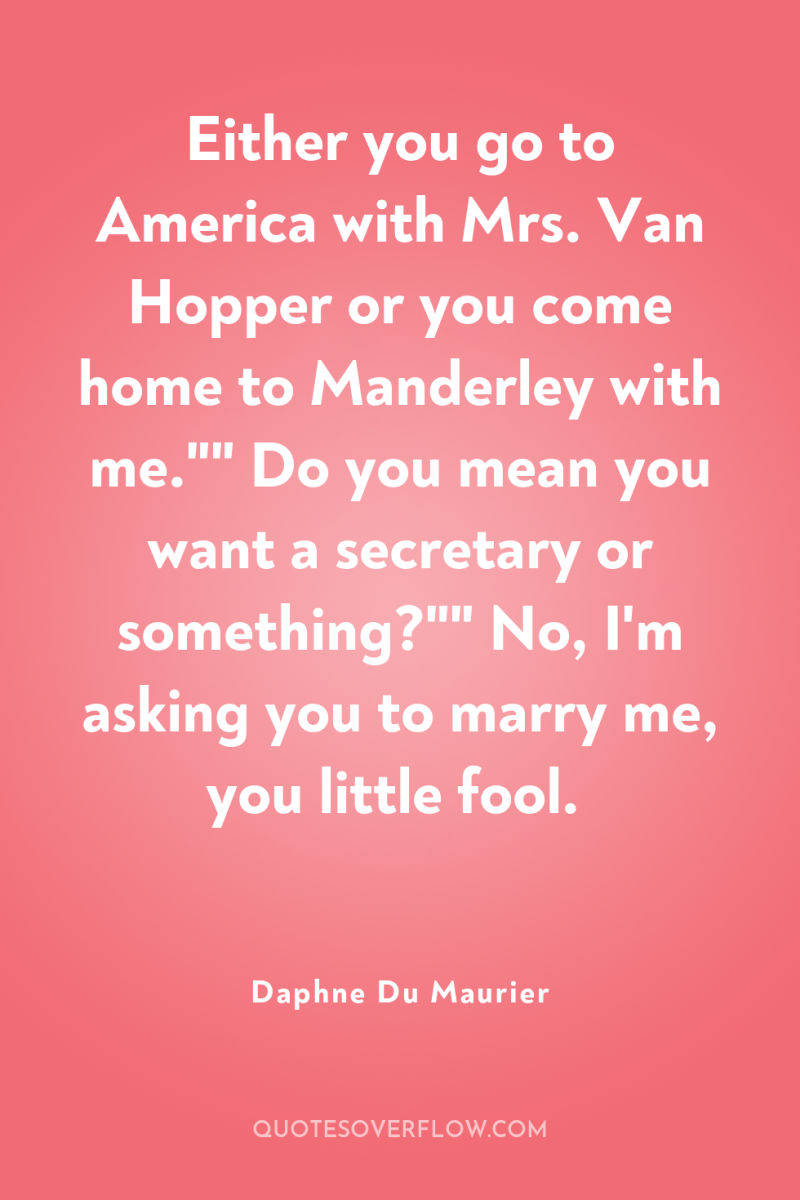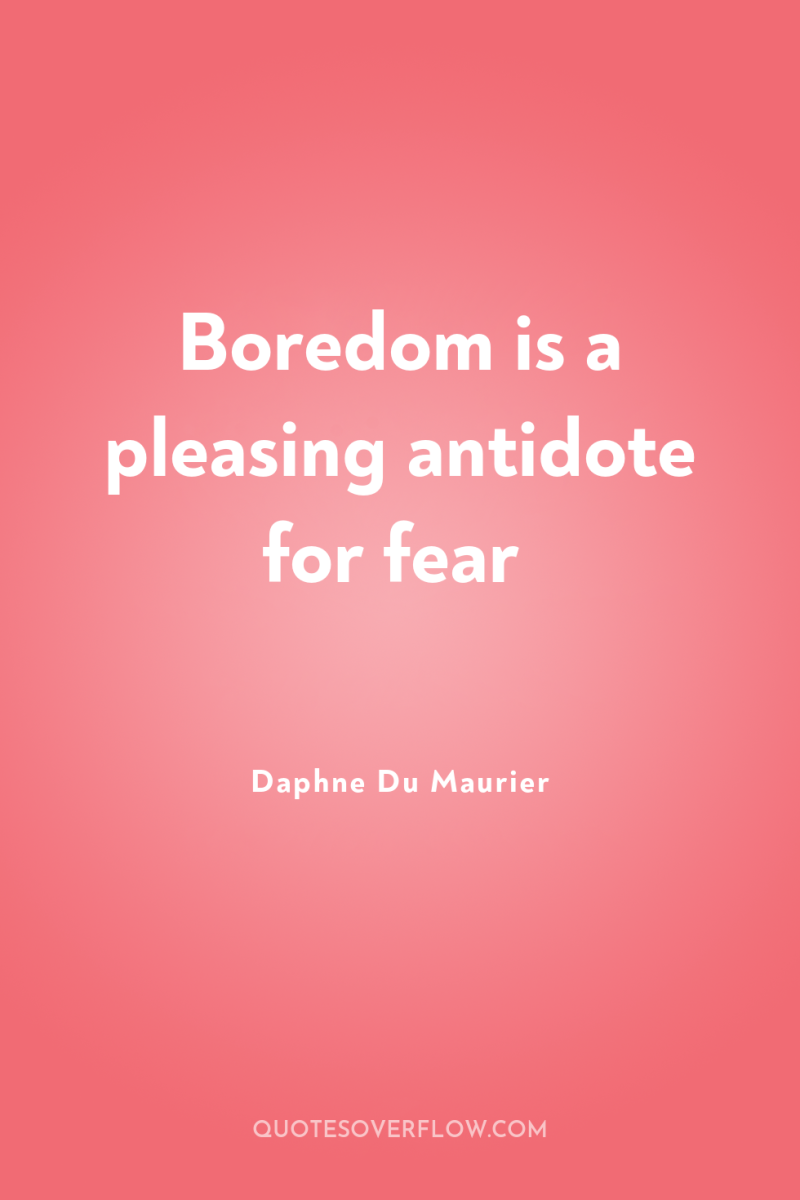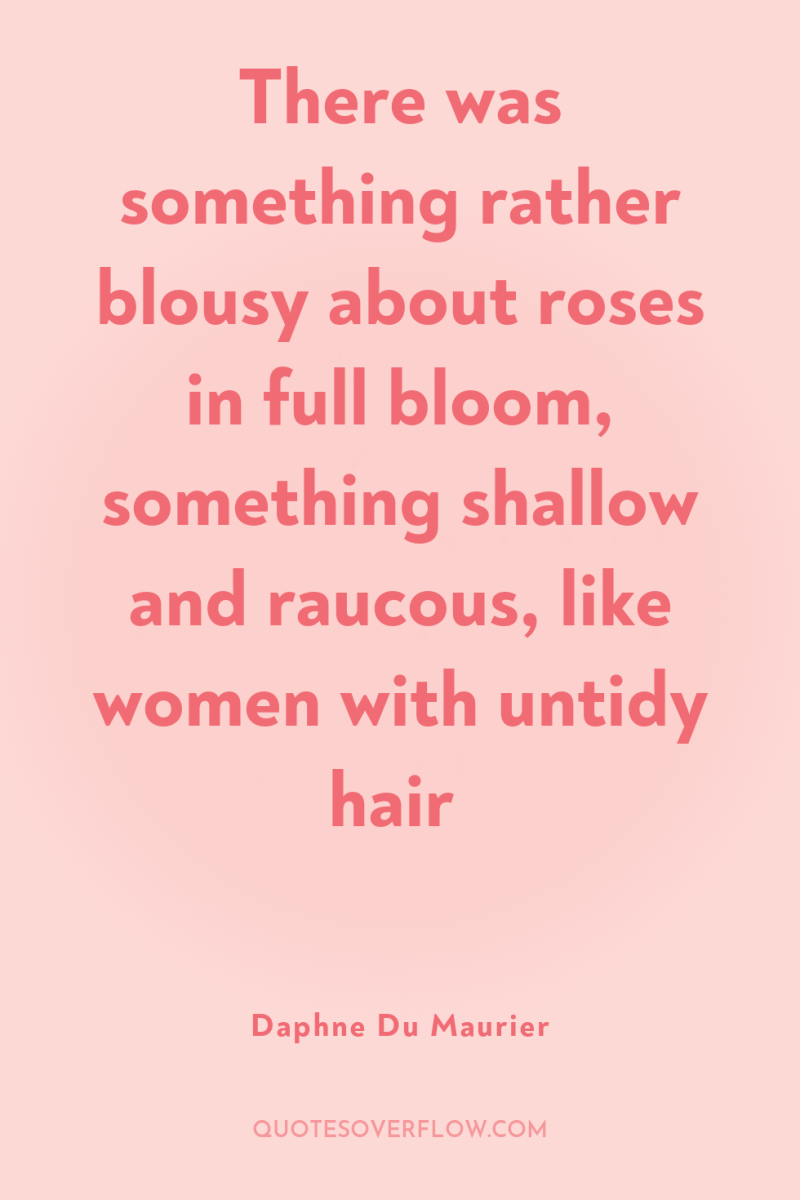
1
I suppose sooner or later in the life of everyone comes a moment of trial. We all of us have our particular devil who rides us and torments us, and we must give battle in the end.Daphne Du Maurier

2
Either you go to America with Mrs. Van Hopper or you come home to Manderley with me."" Do you mean you want a secretary or something?"" No, I'm asking you to marry me, you little fool.Daphne Du Maurier
3
I wondered how many people there were in the world who suffered, and continued to suffer, because they could not break out from their own web of shyness and reserve, and in their blindness and folly built up a great distorted wall in front of them that hid the truth.Daphne Du Maurier
4
They were all fitting into place, the jig-saw pieces. The odd strained shapes that I had tried to piece together with my fumbling fingers and they had never fitted. Frank's odd manner when I spoke about Rebecca. Beatrice and her rather diffident negative attitude. The silence that I had always taken for sympathy and regret was a silence born of shame and embarrassment. It seemed incredible to me now that I had never understood. I wondered how many people there were in the world who suffered, and continued to suffer, because they could not break out from their own web of shyness and reserve, and in their blindness and folly built up a great wall in front of them that hid the truth. This was what I had done. I had built up false pictures in my mind and sat before them. I had never had the courage to demand the truth. Had I made one step forward out of my own shyness Maxim would have told these things four months, five months ago.Daphne Du Maurier

5
Happiness is not a possession to be prized, it is a quality of thought, a state of mind.Daphne Du Maurier

6
We've got a bond in common, you and I. We are both alone in the world.Daphne Du Maurier
7
He had the face of one who walks in his sleep, and for a wild moment the idea came to me that perhaps he was not normal, not altogether sane. There were people who had trances, I had surely heard of them, and they followed strange laws of which we could know nothing, they obeyed the tangled orders of their own sub-conscious minds. Perhaps he was one of them, and here we were within six feet of death.Daphne Du Maurier
8
I wanted to go on sitting there, not talking, not listening to the others, keeping the moment precious for all time, because we were peaceful all of us, we were content and drowsy even as the bee who droned above our heads. In a little while it would be different, there would come tomorrow, and the next day and another year. And we would be changed perhaps, never sitting quite like this again. Some of us would go away, or suffer, or die, the future stretched away in front of us, unknown, unseen, not perhaps what we wanted, not what we planned. This moment was safe though, this could not be touched. Here we sat together, Maxim and I, hand-in-hand, and the past and the future mattered not at all. This was secure, this funny little fragment of time he would never remember, never think about again… For them it was just after lunch, quarter-past-three on a haphazard afternoon, like any hour, like any day. They did not want to hold it close, imprisoned and secure, as I did. They were not afraid.Daphne Du Maurier
9
If only there could be an invention that bottled up a memory, like scent. And it never faded, and it never got stale. And then, when one wanted it, the bottle could be uncorked, and it would be like living the moment all over again.Daphne Du Maurier
10
We can never go back again, that much is certain. The past is still close to us. The things we have tried to forget and put behind us would stir again, and that sense of fear, of furtive unrest, struggling at length to blind unreasoning panic - now mercifully stilled, thank God - might in some manner unforeseen become a living companion as it had before.Daphne Du Maurier

11
Boredom is a pleasing antidote for fearDaphne Du Maurier
12
The moment of crisis had come, and I must face it. My old fears, my diffidence, my shyness, my hopeless sense of inferiority, must be conquered now and thrust aside. If I failed now I should fail forever.Daphne Du Maurier
13
Last night I dreamt I went to Manderley again. It seemed to me I stood by the iron gate leading to the drive, and for a while I could not enter for the way was barred to me. There was a padlock and a chain upon the gate. I called in my dream to the lodge-keeper, and had no answer, and peering closer through the rusted spokes of the gate I saw that the lodge was uninhabited. No smoke came from the chimney, and the little lattice windows gaped forlorn. Then, like all dreamers, I was possessed of a sudden with supernatural powers and passed like a spirit through the barrier before me. The drive wound away in front of me, twisting and turning as it had always done, but as I advanced I was aware that a change had come upon it; it was narrow and unkempt, not the drive that we had known. At first I was puzzled and did not understand, and it was only when I bent my head to avoid the low swinging branch of a tree that I realized what had happened. Nature had come into her own again, and, little by little, in her stealthy, insidious way, had encroached upon the drive with long, tenacious fingers. The woods, always a menace even in the past, had triumphed in the end. They crowded, dark and uncontrolled, to the orders of the drive. The beeches with white, naked limbs leant close to one another, their branches intermingled in a strange embrace, making a vault above my head like the archway of a church. And there were other trees as well, trees that I did not recognize, squat oaks and tortured elms that straggled cheek by jowl with the beeches, and had thrust themselves out of the quiet earth, along with monster shrubs and plants, none of which I remembered surely the miles had multiplied, even as the trees had done, and this path led but to a labyrinth, some choked wilderness, and not to the house at all. I cam upon it suddenly There was Manderley secretive and silent as it had always been, the grey stone shining in the moonlight of my dream, the mullioned windows reflecting the green lawns and the terrace. Time could not wreck the perfect symmetry of those walls nor the site itself, a jewel in the hollow of a hand.” Daphne du Maurier, Rebecca, 1938.Daphne Du Maurier

14
There was something rather blousy about roses in full bloom, something shallow and raucous, like women with untidy hairDaphne Du Maurier
15
The peace of Manderley. The quietude and the grace. Whoever lived within its walls, whatever trouble there was and strife, however much uneasiness and pain, no matter what tears were shed, what sorrows borne, the peace of Manderley could not be broken or the loveliness destroyed. The flowers that died would bloom again another year, the same birds build their nests, the same trees blossom. That old quiet moss smell would linger in the air, and the bees would come, and crickets, the herons build their nests in the deep dark woods. The butterflies would dance their merry jug across the lawns, and spiders spin foggy webs, and small startled rabbits who had no business to come trespassing poke their faces through the crowded shrubs. There would be lilac, and honeysuckle still, and the white magnolia buds unfolding slow and tight beneath the dining-room window. No one would ever hurt Manderley. It would lie always in its hollow like an enchanted thing, guarded by the woods, safe, secure, while the sea broke and ran and came again in the little shingle bays below.Daphne Du Maurier
16
Last night I dreamt I went to Manderley again.Daphne Du Maurier
17
He looked down at me without recognition, and I realized with a little stab of anxiety that he must have forgotten all about me, perhaps for some considerable time, and that he himself was so lost in the labyrinth of his own unquiet thoughts that I did not exist.Daphne Du Maurier
18
You have blotted out the past for me, you know, far more effectively than all the bright lights of Monte Carlo. But for you I should have left long ago, gone to Italy, and Greece, and further still perhaps. You have spared me all those wanderings.Daphne Du Maurier
19
Those dripping crumpets, I can see them now. Tiny crisp wedges of toast, and piping-hot, flaky scones. Sandwiches of unknown nature, mysteriously flavoured and quite delectable, and that very special gingerbread. Angel cake, that melted in the mouth, and his rather stodgier companion, bursting with peel and raisins. There was enough food there to keep a starving family for a week.Daphne Du Maurier
20
I thought of all those heroines of fiction who looked pretty when they cried, and what a contrast I must make with a blotched and swollen face, and red rims to my eyes.Daphne Du Maurier
21
This house sheltered us, we spoke, we loved within those walls. That was yesterday. To-day we pass on, we see it no more, and we are different, changed in some infinitesimal way. We can never be quite the same again.Daphne Du Maurier
22
They are not brave, the days when we are twenty-one. They are full of little cowardices, little fears without foundation, and one is so easily bruised, so swiftly wounded, one falls to the first barbed word. To-day, wrapped in the complacent armour of approaching middle age, the infinitesimal pricks of day by day brush one but lightly and are soon forgotten, but then–how a careless word would linger, becoming a fiery stigma, and how a look, a glance over a shoulder, branded themselves as things eternal.Daphne Du Maurier
23
I am glad it cannot happen twice, the fever of first love. For it is a fever, and a burden, too, whatever the poets may say. They are not brave, the days when we are twenty-one. They are full of little cowardices, little fears without foundation, and one is so easily bruised, so swiftly wounded, one falls to the first barbed word. To-day, wrapped in the complacent armour of approaching middle age, the infinitesimal pricks of day by day brush one but lightly and are soon forgotten, but then--how a careless word would linger, becoming a fiery stigma, and how a look, a glance over a shoulder, branded themselves as things eternal. A denial heralded the thrice crowing of a cock, and an insincerity was like the kiss of Judas. The adult mind can lie with untroubled conscience and a gay composure, but in those days even a small deception scoured the tongue, lashing one against the stake itself. .Daphne Du Maurier
24
She had to live in this bright, red gabled house with the nurse until it was time for her to die... I thought how little we know about the feelings of old people. Children we understand, their fears and hopes and make-believe.Daphne Du Maurier
25
I know that age, it's a particularly obstinate one, and a thousand bogies won't make you fear the future. A pity we can't change over.Daphne Du Maurier
26
I held out my arms to him and he came to me like a child.Daphne Du Maurier
27
I would have gone too but I wanted to come straight back to you. I kept thinking of you, waiting here, all by yourself, not knowing what was going to happen.Daphne Du Maurier
28
There was never an accident. Rebecca was not drowned at all. I killed her. I shot Rebecca in the cottage in the cove. I carried her body to the cabin, and took the boat out that night and sunk it there, where they found it today. It's Rebecca who's lying dead there on the cabin floor. Will you look into my eyes and tell me that you love me now?Daphne Du Maurier
29
Maxim's voice, clear and strong, "Will someone take my wife outside? She is going to faint.Daphne Du Maurier
30
I wondered why it was that places are so much lovelier when one is alone. How commonplace and stupid it would be if I had a friend now, sitting beside me, someone I had known at school, who would say: “By-the-way, I saw old Hilda the other day. You remember her, the one who was so good at tennis. She’s married, with two children.” And the bluebells beside us unnoticed, and the pigeons overhead unheard. I did not want anyone with me. Not even Maxim. If Maxim had been there I should not be lying as I was now, chewing a piece of grass, my eyes shut. I should have been watching him, watching his eyes, his expression. Wondering if he liked it, if he was bored. Wondering what he was thinking. Now I could relax, none of these things mattered. Maxim was in London. How lovely it was to be alone again. .Daphne Du Maurier
31
Why did dogs make one want to cry? There was something so quiet and hopeless about their sympathy. Jasper, knowing something was wrong, as dogs always do. Trunks being packed. Cars being brought to the door. Dogs standing with drooping tails, dejected eyes. Wandering back to their baskets in the hall when the sound of the car dies away.Daphne Du Maurier
32
The sea, like a crinkled chart, spread to the horizon, and lapped the sharp outline of the coast, while the houses were white shells in a rounded grotto, pricked here and there by a great orange sun.Daphne Du Maurier
33
The road to Manderley lay ahead. There was no moon. The sky above our heads was inky black. But the sky on the horizon was not dark at all. It was shot with crimson, like a splash of blood. And the ashes blew towards us with the salt wind from the sea.Daphne Du Maurier
34
George Gey paid his way through a biology degree at the University of Pittsburgh by working as a carpenter and mason, and he could make nearly anything for cheap or free. During his second year in medical school, he rigged a microscope with a time-lapse motion picture camera to capture live cells on film. It was a Frankensteinish mishmash of microscope parts, glass, and 16-millimeter camera equipment from who knows where, plus metal scraps, and an old motor from Shapiro’s junkyard. He built it in a hole he’d blasted in the foundation of Hopkins, right below the morgue, its base entirely underground and surrounded by a thick wall of cork to keep it from jiggling when streetcars passed. At night, a Lithuanian lab assistant slept next to the camera on a cot, listening to its constant tick, making sure it stayed stable through the night, waking every hour to refocus it. With that camera, Gey and his mentor, Warren Lewis, filmed the growth of cells, a process so slow - like the growth of a flower - the naked eye couldn’t see it. They played the film at high speed so they could watch cell division on the screen in one smooth motion, like a story unfolding in a flip book. .Skloot
35
Every moment was a precious thing, having in it the essence of finality.Daphne Du Maurier